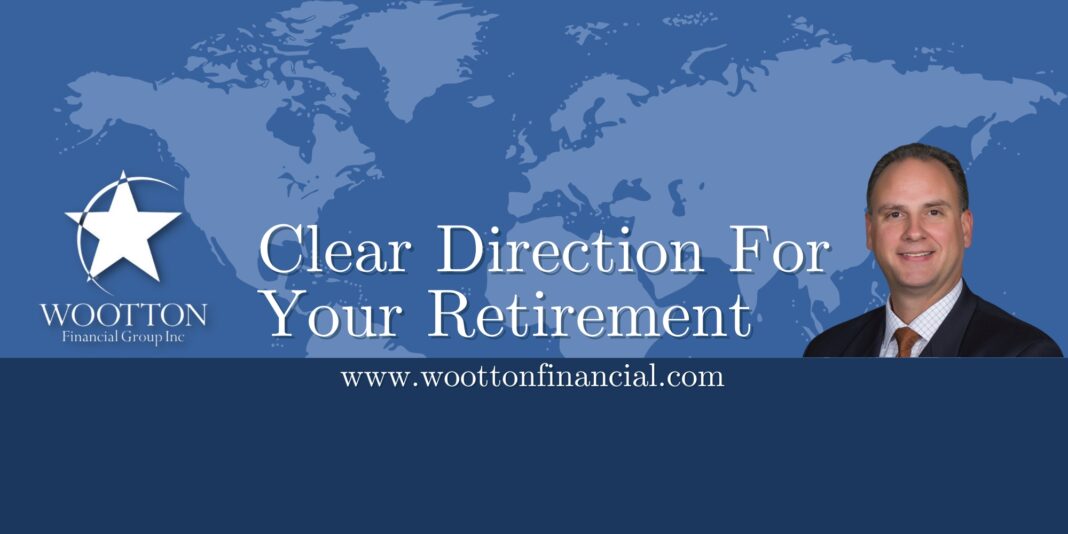Wootton Financial: Will a Recession Rob Your Retirement?
We all have no doubt heard the media pontificating about whether a recession will occur and if so, to what extent. Shallow, moderate or deep? How long will its effects on the economy last?
Personally, I believe the recession is already here and has been for some time and will continue (even if the stock market is completely disjointed from reality and the credit markets currently). However, when a recession hits, much more is at stake than the value of your investment account. During The Great Recession, December 2007 through June 2009, not only did Americans lose $16 trillion in net worth, unemployment increased by 4.5 percentage points and over 8.7 million jobs were lost. The Covid recession was no walk in the park either. How quickly we forget.
So, when economists start pointing to signs of a recession, it is natural to feel anxious. Everyone, but especially retirees on a fixed income or those getting ready to begin retirement can feel especially vulnerable.
Here’s the good news however, while the economy is largely unpredictable, your retirement income doesn’t have to be. By getting a clear picture of where your finances stand and seeking Clear Direction for Your Retirement®, you can create a plan that builds in worst-case scenarios and feel more confident about retirement – even during a recession.
So, let’s look at four things to check right now so your prepared.
- Expenses – Regardless of market conditions (bull or bear), knowing what you spend and how it could be affected by things like inflation or job loss is critical in being prepared in advance for the worst.
Many times, savings takes a back seat to living expenses. In 2018, a Federal Reserve Board survey found that one-quarter of nonretired adults had no savings at all. What about you? Recessions often lead to job loss. How long could you survive without nasty repercussions? What if you’re retired and on a fixed income from various pensions and retirement savings. Could you adjust your budget quickly in needed?
Take away: Know what you spend and how much flexibility you have should things get sour economically.
- Assets – Where are the components of your “nest egg”? Do you know and have you done an inventory? Are you on top of their performance and risk implications and how they could be affected by a significant decrease in value? How would that effect your ability to meet expenses, especially given today’s longer life expectancies? On average, the stock market loses 13% in a correction and 32.5% in a bear market. Historically, U.S. markets have always recovered to go to higher highs, that’s not guaranteed however, just ask Japan.
Take Away: Know where your money is, what it is earning (or not) and how you’re managing risk.
- Risk Exposure – While investing in the market always carries risk, it is an effective way to grow assets — particularly for pre-retirees who got a late start to their savings. But how much of your savings should be invested in the market and how should your risk be managed?
A fiduciary planner can help you evaluate your tolerance for risk. That is, the degree of volatility (gain or loss) in investment returns you are willing to withstand. Additionally, and more importantly, is knowing how much risk you NEED to meet your goals, not just what you’re comfortable with. Once you know tolerance and need, you must then decide how you want to manage the investment risk of the assets that need to be at risk.
Take Away: Know your risk tolerance, risk NEED and risk management approach. Adjust as needed based on where you are in your phase of life and goals.
- The Income Gap – If item #1 above exceeds your income sources from item #2, you have a gap that needs to be filled whether short or long term. You could obviously cut expenses (the importance of point #1) or try to earn more rate of return (requiring more of #3 taken on #2). For most, it’s a combination of things and this where financial planning is crucial. It helps you know whether there’s a gap long-term and the most efficient way to fill it. You don’t always need to take on more risk or cut expenses. Sometimes, you can strategically reallocate assets to provide safer and more secure income streams down the road at a certain point in time.
Take Away: Know whether you have an income gap now or will have one in the future. Make adjustments now through sound financial planning to mitigate the amount of risk necessary to solve the problem.
 I hope this is helpful to your retirement journey. Call us, come see us or visit us at www.woottonfinancial.com, we’d love the opportunity to help address your questions and concerns and provide you Clear Direction for Your Retirement®.
I hope this is helpful to your retirement journey. Call us, come see us or visit us at www.woottonfinancial.com, we’d love the opportunity to help address your questions and concerns and provide you Clear Direction for Your Retirement®.
Investment Advisory services offered through Game Plan Advisors, Inc., a registered investment advisor. Insurance services offered through Wootton Financial Group, Inc. Game Plan Advisors, Inc. and Wootton Financial Group, Inc. are affiliated through common ownership. Neither Game Plan Advisors, Inc. nor Wootton Financial Group, Inc. offer legal or tax advice. Please consult the appropriate professional regarding your individual circumstance. Not associated with or endorsed by the Social Security Administration or any other government agency.















